- Home
- Yvonne Navarro
Paleo
Paleo Read online
When Buffy got a firm enough footing, she came up again, hard, swinging her bone-weapon in a neat semicircle across the area directly under the jawline.
There was no roar of pain.
This time, there wasn’t any sound at all.
With its airway and main artery severed, thea creature wobbled soundlessly where it stood for an overlong ten seconds, opening and closing its mouth as if it couldn’t believe what had just happened. More blood—Buffy had never seen anything bleed this much—fountained from the upper part of the wound, spraying everything in its way. Buffy felt a line of it cross her face, warm, wet, and utterly disgusting.
Finally, the thing lay lifeless in front of them.
“Piece of cake,” Buffy quipped, but she didn’t mean it.
Oz, covered in grit with a bruise along one pale cheekbone, raised an eyebrow. “I’m glad you think so,” he said gently. “But . . . where’s the other one?”
Buffy the Vampire Slayer™
Buffy the Vampire Slayer
(movie tie-in)
The Harvest
Halloween Rain
Coyote Moon
Night of the Living Rerun
Blooded
Visitors
Unnatural Selection
The Power of Persuasion
Deep Water
Here Be Monsters
The Angel Chronicles, Vol. 1
The Angel Chronicles, Vol. 2
The Angel Chronicles, Vol. 3
The Xander Years, Vol. 1
The Xander Years, Vol. 2
The Willow Files, Vol. 1
How I Survived My Summer
Vacation, Vol. 1
Available from ARCHWAY Paperbacks and POCKET PULSE
Buffy the Vampire Slayer adult books
Child of the Hunt
Return to Chaos
The Gatekeeper Trilogy
Book 1: Out of the Madhouse
Book 2: Ghost Roads
Book 3: Sons of Entropy
Obsidian Fate
Immortal
Sins of the Father
Resurrecting Ravana
Prime Evil
The Evil That Men Do
Paleo
The Watcher’s Guide: The Official Companion to the Hit Show
The Postcards
The Essential Angel
The Sunnydale High Yearbook
Pop Quiz: Buffy the Vampire Slayer
The Monster Book
Available from POCKET BOOKS
PALEO
YVONNE NAVARRO
An original novel based on the hit TV series created by Joss Whedon
Historian’s Note:
This story takes place during the third season.
This book is a work of fiction. Names, characters, places and incidents are products of the author’s imagination or are used fictitiously. Any resemblance to actual events or locales or persons, living or dead, is entirely coincidental.
An Original Publication of POCKET BOOKS
POCKET BOOKS, a division of Simon & Schuster, Inc.
1230 Avenue of the Americas, New York, NY 10020
Visit us on the World Wide Web:
http://www.SimonSays.com
™ and copyright © 2000 by Twentieth Century Fox Film Corporation. All rights reserved.
All rights reserved, including the right to reproduce this book or portions thereof in any form whatsoever.
For information address Pocket Books, 1230 Avenue of the Americas, New York, NY 10020
ISBN: 0-7434-3155-3
POCKET and colophon are registered trademarks of Simon & Schuster, Inc.
For
Jeff Osier,
who first fired my interest
in dinosaurs years ago.
Thanks.
Acknowledgments
A book about vampires and dinosaurs is just too much fun, and you can’t have something like that come into being without having a whole bunch of people to thank. So, in no particular order, get ready . . . set . . . Go!
Lisa Clancy, Howard Morhaim, Nancy Holder, Chris Golden, Jeff Osier, Don VanderSluis, Micol Ostow, John Platt, Sephera Giron, Martin Cochran, Matthew Woodring Stover (I stole his word. Again.) and Bob Eggleton.
Prologue
Chapter 1
Chapter 2
Chapter 3
Chapter 4
Chapter 5
Chapter 6
Chapter 7
Chapter 8
Chapter 9
Chapter 10
Chapter 11
Chapter 12
Chapter 13
Chapter 14
Chapter 15
Epilogue
About the Author
Prologue
“ALL RIGHT,” DANIEL ADDISON SAID. “WHERE DO WE start?” No one answered, of course, because no one else was in the basement storeroom; it was just him, the dust, and the mousetraps surrounded by wooden crates that hadn’t been looked at in years. He ran a hand through his hair and was reminded that he needed a haircut, then belatedly realized how grimy his hands had gotten from pushing everything around down here. Ridiculous grunt work, but the task wasn’t as bad as he’d imagined it might be. Daniel knew he could’ve fared much worse when his supervisor at the Sunnydale Museum of Natural History had doled out the grad student assignments. While he tended to think of the man as a dried-up old prune, somewhere in Professor Rami’s shriveled chest apparently beat a heart: he could’ve just as easily assigned Daniel to the Herpetology Department. Going over an inventory of snake skins might make the day for some people, but Daniel’s interest in reptiles ran to a much larger scale.
The boxes were stenciled with dates and he’d arranged them chronologically; now it was time to pry them open and see what was inside and how it ought to be entered in the museum’s computer files. The crates went back more than sixty years, to when the museum had first been built, and he was looking at about fortyfive boxes. Whatever was in these things had long ago been cycled out of past exhibits, and prior to 1960 the contents hadn’t been added to the data banks. Now it was time to rectify that, and what better slave labor than one of the local college students?
“Banzai,” Daniel said, just to hear his own voice, but he only sounded annoyed and resentful. He picked up a crowbar and set to work on the lid of the earliest-dated crate. It was eerie down here in the basement, a good fifteen degrees chillier than on the first floor.
Occasionally he could hear sounds, but the museum’s heavy construction muffled the noise above him beyond recognition. Daniel doubted he could tell the difference between footsteps or something being dropped. He was fairly disoriented, but he thought he might be at the back of the huge building; the only windows down here were made of two-level heavy glass blocks, so there was no way to tell without a floor plan.
The lid of the first box, marked 1939, suddenly came free with a screech and a jerk that sent him stumbling backward. The scent of mildew drifted out, undercut by something else that Daniel hadn’t expected—a smoky smell that brought to mind the image of burning paper. Glad he’d thought to wear work gloves and, wishing the light down here was a little better, the young man began lifting things out of the crate. Professor Rami had assigned him one of the Paleontology Department’s laptop computers, and the idea was to unpack each crate’s contents and enter everything on the data inventory form, then carefully repack every box. Tedious but not so complicated, and Daniel tried to convince himself that it was worth it—he might find a cool item or two, something forgotten or that, out of lack of knowledge at the time, had been thought unimportant. Anything like that he would return to the Paleontology Department for examination.
While he wasn’t sure what he had expected to discover in these crates, the items he lifted from the first
one were already oddly out of place. He’d anticipated records of old digs, photographs, and maybe broken fossils—really good finds would still be on exhibit—but certainly not this. Perplexed, Daniel sat back and surveyed what he’d uncrated. No bones here; instead, he was looking at the scorched remains of someone’s tool kit: hammers, saws, chisels, brushes with no bristles and the head of a small spade, what was left of a leather hat and pair of gloves, a canteen, and a primitive pair of half-melted goggles. There was a beat-up metal clipboard, a ragged roll of plasterer’s scrim that had escaped the as-yet-unexplained flames, even a still half-full sack of plaster, all of it charred and covered with a fine layer of black soot. Stuffed to the side was a blackened leather saddlebag, and when Daniel looked inside, he found a mound of ashes that might have once been paper.
Tucked beneath a twine-encircled stack of papers and files whose edges were burned to a mottled brown was the final item in the box of gear: the shredded pieces of a heavy, army-style canvas tent. When Daniel spread it out, the skin at the back of his neck crawled. It looked like an entire side of it had been destroyed and there wasn’t nearly enough left to provide shelter. Worse, it was obvious from the smoke stain pattern that the fire had been on the inside of the tent.
Daniel shivered and sat back, again surveying the crate’s contents for a moment before reaching for the files. He cut the old twine encircling them with his pocketknife and began to separate the stack carefully, wincing as some of the dry, fire-damaged pages crumbled in his hands. It took him nearly an hour, but he finally had a name and enough information to combine with the 1939 date so that he could lose the gloves and do a search of the museum’s data files on the laptop.
Nuriel, Gibor (Professor). B. 1891 / D. 1939—Dept. of Paleontology. Hire Date: 2/14/13. Termination Date: N/A. While on a dig at a Big Bend, Texas location on July 2, 1939, Gibor Nuriel was killed by an explosion and fire inside his tent. The explosion was attributed to a faulty camping stove. There are no known surviving family members. Material recovered from his tent was deemed irreparably damaged and of no use, and was relegated to chronological storage. Per orders of the Probate Court, Prof. Nuriel’s personal estate was liquidated and the resulting funds (total $658.00), were donated to the Museum.
Frowning, Daniel finished reading the entry, then rubbed the goose bumps on the back of his neck. There was something unaccountably . . . depressing about the notion that this middle-aged scientist had died a horrible death in what back then had been the center of nowhere, and this was all that had been recorded about his life: a stupid accident with a camping stove that should have been outside his tent, no relatives, and his whole life had been worth $658.00. It was just made worse by the way some thoughtless clerk had called Nuriel’s final work “of no use.” The man died out there, for God’s sake. There has to be something worthy of note in these files and papers. All a person has to do is dig a little, and isn’t that what paleontology is all about?
Forgoing the gloves, Daniel went back over to where he’d spread out the contents of the 1939 crate and knelt on the floor in front of the three stacks of paper he’d lifted out of it. Working carefully, he flipped through the sheets, stubbornly checking every single page before laying it aside. Cracked and stained with water, the edges were ferociously prone to disintegrating no matter how gingerly he handled them, and Daniel had to admit that what he saw wasn’t encouraging. He could imagine the whole scene: the explosion of the stove fuel that probably—and hopefully—knocked Nuriel unconscious, the flames sweeping over everything inside the tent while the other members of the team ran for buckets of water to try to put it out. And they had. The proof was on every page where the professor’s blocky handwriting, which at one time had probably been quite easy to read, was now water-smeared and mostly illegible.
Daniel began going through the last stack but didn’t expect the results to be any better. He’d been involved here for almost two years while he went to the local university, but outside of the occasionally semiinteresting tasks like this one, the museum was still assigning him the same old grunt work; all the really cool projects went to the people who’d already graduated. Shoot, he was just as smart—smarter—than any of the others doing post-grad work here. Most of them couldn’t find their way out of a wet paper bag unless someone else ripped it open. But they were still the ones who were chosen to go on the digs during the summer months, while Daniel was forced to stick around and mop up the slop.
Somehow he’d never pictured the start of his paleontology career as being like this. He might be young, but he knew his stuff just as well or better than any of the staff here. Why did he have to paw around the museum’s dirty basement while other people got to go out on digs and get hands-on experience? His big coup so far—and it wasn’t much—was that out of a half-dozen candidates, Professor Rami had chosen Daniel to go over and give a talk on dinosaurs to one of the senior classes at Sunnydale High School next Tuesday. Daniel had probably been elected only because he’d graduated from there. It sure wasn’t where someone with his level of intelligence deserved to be—out in the field with the rest of the real paleontologists—but at least it would get him away from this dirty, lower-level drudgery. He—
“Whoa,” Daniel said. “What’s this?”
There’d been a bulge at the bottom of the last stack, a place where the papers didn’t line up evenly. He hadn’t paid any attention to it at first—everything here was water-warped and a mess—then he’d lifted the next two sheets of paper. Underneath was a leather notebook, the cover split so badly that it was almost torn in two, while the stitching at its edges and spine was blackened by the fire and left smudges of soot on Daniel’s fingers. Wow, Daniel thought reverently. Professor Nuriel’s dig journal. Could he really hope to find anything inside, or would it be as washed away as all the other information?
As carefully as he could, Daniel opened it.
Pay dirt! At first glance it looked like Nuriel’s chunky writing still filled a number of the pages. Daniel scanned it eagerly, but his delight soon did a fast fade. Yeah, there was info here, but way too much of it; the bottom half of nearly every page was obliterated. Too bad. There had been so much here that he could have learned, overlooked information that could have helped him get ahead in a department that a lot of the students called “Department of Dinosaurs” under their breath. The older people here at the museum were stodgy and unyielding, with no time, patience or interest in the fresh concepts or new questions the younger students raised. Some of the theories that the dead professor hinted at might, had all the information been there, have been atypical, but how would Daniel—or anyone else—ever know?
Fascinated, Daniel forgot about the damp basement air and the chilliness of the concrete floor beneath his crossed legs. Even though so much was gone and lots of the entries were probably just preambles to things that were proven in later decades by other paleontologists, he could still tell that some of Professor Nuriel’s entries were . . . well, unique, that he’d had an open mind rarely found in the older members of the field. Written in a diary-like style and filled with cross-outs, the last couple of pages in particular caught Daniel’s attention. He read them, then read them again, nearly unable to comprehend the words on the pages:
28 July 1939 Wednesday I’ve made the most amazing strangest discovery of my entire career, and this in the midst of the locals’ efforts to make this area into some kind of a national park—they are calling it “Big Bend National Park.” I can only hope this place remains hidden inaccessible, but I doubt it—the trading post they are setting up at Lajitas will take care of that. Mankind spreads upon the most precious areas of our world like fleas on the back of a stray dog. Someday the roads here in South Brewster County will be paved and it will be much easier for the common people to visit and ultimately destroy the wondrous things that nature has preserved.
Speaking of which, while Jimmy and the rest of the crew were working on freeing what appeared to be the femur of an iguanodon
t in the main part of the site, I had gone off behind a large outcropping to attend to the ne
Like all the other pages in the journal, the rest of the words smeared into the watery equivalent of a Rorschach test, but Daniel was able to pick it up on the opposite side of the journal:
old leather saddlebag. The papers inside are written in what I believe is a Romany dialect, but I can translate enough of it to theorize that it is a spell ritual of some sort. It’s very strnage peculiar and seems to postulate that something dead can be brought back to life, but it’s also very specific with regards to what that object is—no people, only animals “such as large lizards or the petrified remains of their spawn.” Interestingly enough there’s a reference in the text that might pertain to ancient Greek mythology. Roughly put to English, this is the incantation:
Hear this call, spirits of Ladonithia
Awaken and return from your abyss to this frozen host
First of four, to then combine
And grant to he who resurrects you
A single wish fulfilled.
Another chunk of the writing was destroyed at the bottom, but Daniel expected this. Again the text picked up on the other side of the page, and here the young man’s eyes widened with every paragraph he read:
Wednesday and so I must wait for the Mexican workers to leave. They will stay through Saturday afternoon, then return to their families for Sunday worship. There’s no logical reason to try this except for curiosity, but I am a scientist and so must investigate even that. “Petrified remains of their spawn”—could that not refer to, perhaps, a fossil? There’s precious little entertainment in this dismal location, and so I’ve selected the small (though regrettably incomplete) skeleton of a young hypsilophodont. Reanimation? Impossible!!! I do this only for amusement’s sake, of course, and so must hide my foolishness from the

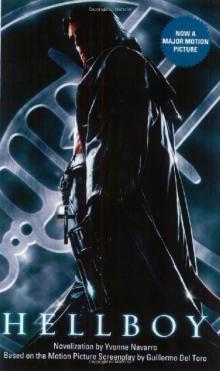 Hellboy
Hellboy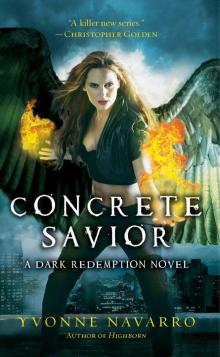 Concrete Savior
Concrete Savior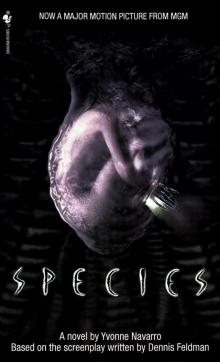 Species
Species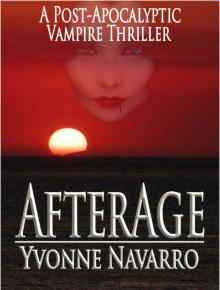 AfterAge
AfterAge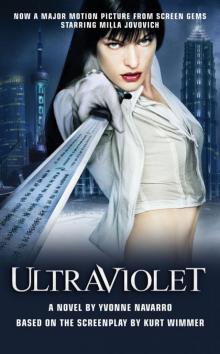 Ultraviolet
Ultraviolet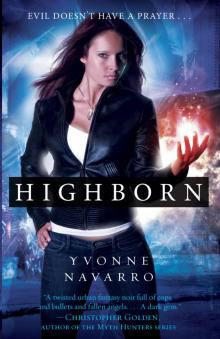 Highborn
Highborn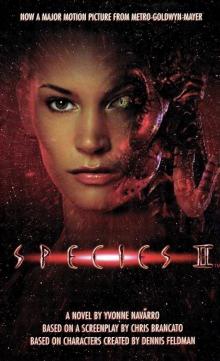 Species II
Species II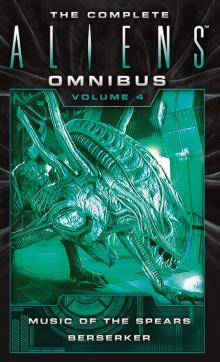 Aliens Omnibus 4
Aliens Omnibus 4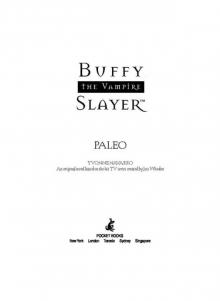 Paleo
Paleo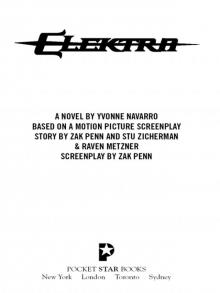 Elektra
Elektra